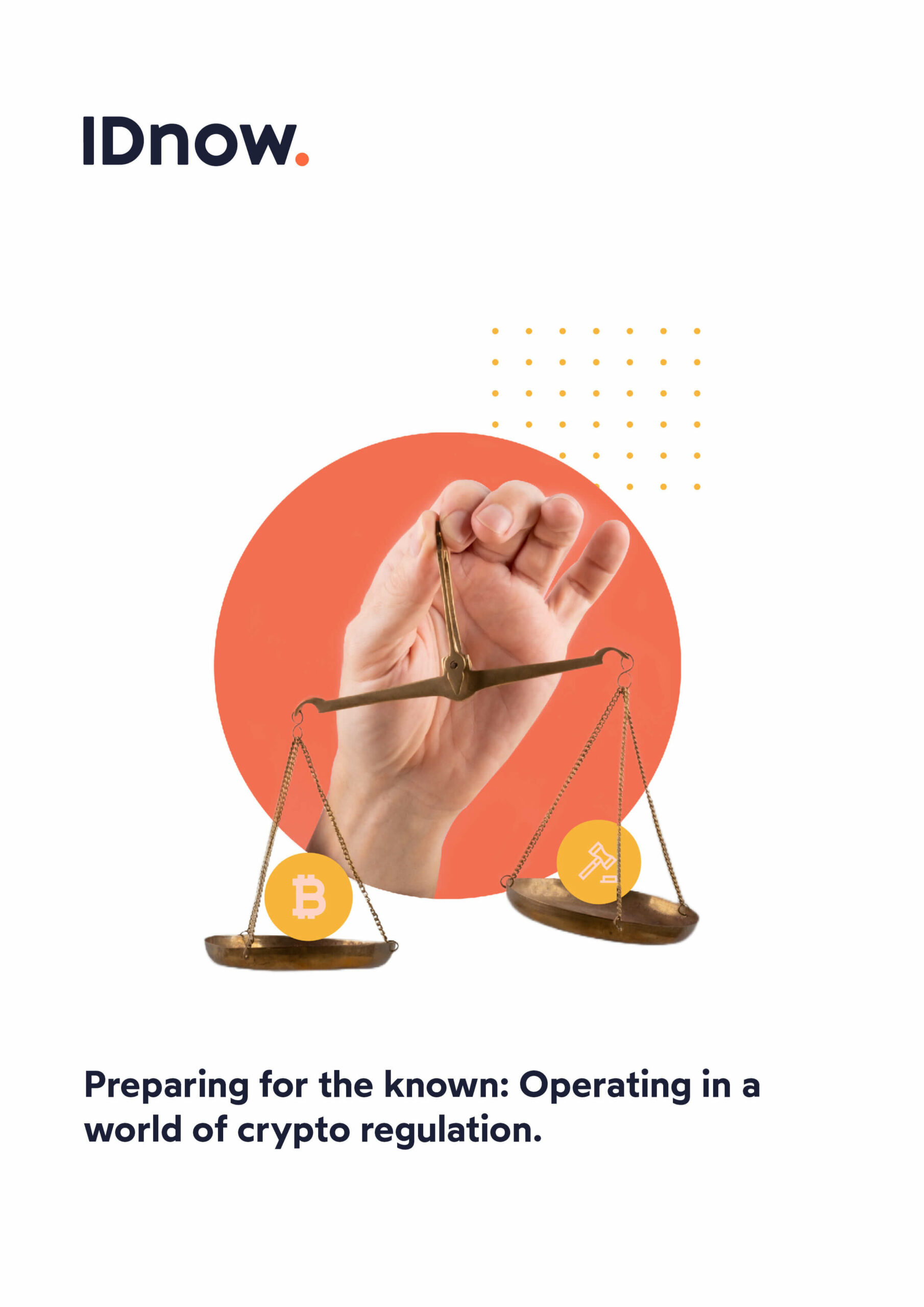IDnow sits down with David Gyori, CEO of Banking Reports to discuss upcoming trends in fintech, the importance of multi-jurisdictional solutions, and why the current state of crypto reminds him of the 17th century tulip mania crisis.
As a fintech consultant and thought leader, what first attracted you to the industry, and how have you seen the world of fintech change since you first became involved?
So, the most beautiful thing about financial technology is that bankers and experts around the world underestimate the complexity of it. Fintech is about payments technology; new channels like augmented reality, virtual reality; all the regulatory issues, including eKYC, AML, onboarding; wealth tech, wealth management, including open banking, access to account, asset tokenization, decentralized currencies, roboadvisors, personal financial dashboards, data tech, big data, AI, machine learning, neo banks, core banking technology, and even quantum finance, which is an upcoming new arena within financial technology. So, from POS innovation to central bank digital currencies (CBDC) from video banking to virtual reality, and metaverse, it’s more diverse, more complex [than people think].
And this complexity attracted me.
You are the CEO of Banking Reports London, which provides fintech training for retail and investment banks; what types of subjects and themes are covered in the course?
My training programs deal with strategy and tactics of digital transformation, financial technology, and emerging innovation in banking all around the world. I provide training programs to bankers in well over 50 countries face to face and online. I am always learning things myself.
What are some of the major UK and European fintech trends that we can expect in the coming few years?
So, the major trends will revolve around two things: one, Profitability, two, Regulatory environment. These two components will determine the next five years of financial technology. Following the 2008 crisis, there was abundant funding, there was a lot of liquidity, interest rates were low, and investors were in a growth mindset as opposed to a value-investing mindset and investors wanted companies with great growth potential. Now, with a higher interest rate and more inflationary environment, investors want prompt profit.
So, profit is king. Looking at the 50,000 small, nimble, flexible creative, intellectually inspiring fintech startups, we will have to be selective to find the ones that can become profitable or at least offer a potential roadmap to profitability in the short run or maximum midterm. Probably, of the 50,000 candidates, there will be around 5,000 – 15,000, the rest will go down or be acquired, or merge into potentially profitable ones.
On the other hand, the second trend, Regulation will be equally as important. Regulators are waking up, incumbent credit institutions (ie banks) are waking up and learning the name of the game. As they want to go ahead in a fully compliant, well organized, regulated, supervised way, regulators will have to up their game and create a safe and crystal-clear environment for emerging digital innovations, and this is very exciting.
Good regulators now have a chance to create a global best practice environment. Some of the emerging countries now have the chance to jump ahead; to leapfrog, and to produce an environment that attracts the best companies. Others will fall behind or fall further behind. So, this is a regulatory point of division, and more than ever in the past 30 years, we need smart and visionary regulators.
Preparing for the known: Operating in a world of crypto regulation.

How about challenges? With increasing importance placed on fintech [partly due to pandemic-induced acceleration], what are some of the dangers and challenges associated with banks and financial institutions rapidly implementing fintech and regtech solutions?
Regulators should focus on the areas that are valuable, that have real potential, such as CBDC, Fiat currency, as well as blockchain. Blockchain as a technology, as a distributed ledger technology is making banking safer, if applied well. So, blockchain technology has great potential for trade finance, through securities clearing, to interbank clearing, from smart contracts to registering derivatives, and even KYC-related activities. Blockchain has great potential if it is compliant and applied well, and can make banking better, more transparent, more professional, more trustworthy, safer, and more compliant, and that’s good.
Learning from some of the key innovations in the crypto world is also a great opportunity. But, cryptocurrencies, as decentralized, haphazard, no intrinsic value, no Fiat, no sovereign-appointed value in the background are dangerous, and probably the greatest bubble ever in history. I like to compare it to the tulip seed crisis in 17th century Amsterdam, when the price of tulip seeds went up to the price of residential real estate, and then it all crashed. A reason why cryptocurrencies in their current format are non-viable is a lack of material compliance; a lack of nominal price stability by design, which is a core characteristic of money as per money in terms of payments; a lack of sovereign control over monetary supply, which is very important in certain points in history.
Now we are battling inflation, but there is only one thing worse than inflation – deflation. Look at the energy crisis and look at how Bitcoin is eating up countries’ energy. Look at environmental considerations and try to put it together with servers running to the fullest across the world. Material costs, real cost of transactions, not illusory, imaginary costs, but real-life costs.
Look at all the fraud cases intended, unintended, deeply criminal, somewhat criminal, gray area, black area, full of fraud, and there is something very important, which is hidden and very important – a lack of interest rate content and lack of intrinsic value. An asset lacking interest rate content can be valuable, for example, gold is an asset lacking intrinsic value that can be valuable. Think about modern currency, it has very fractional reserves in the background, basically it lacks classic intrinsic value, but throughout history, throughout monetary history, assets without any of these two – interest rate content as well as intrinsic value – have been doomed to fail.
Current decentralized cryptocurrencies can be characterized by a dual lack of characteristics: interest rate content and intrinsic value. Warren Buffet and Charlie Munger are perfectly right about cryptocurrencies.
David Gyori, CEO at Banking Reports
However, regulators still have a great chance to focus on the good areas from blockchain to CBDC, from meaningful asset tokenization to certain synthetic units of corporate settlement. So, there are still great opportunities, but in this arena, regulators themselves must be selective, and selective in a conscious, premeditated yet strategic, tactical, and programmatic way.
Are there any countries that could be considered more advanced in the regulation of cryptocurrency?
This is a difficult question because we are in the process, and regulators are now trying to work out their positions. What we do see is that in terms of certain sub areas like CBDCs, certain countries are one or two steps ahead. For example, China has done some amazing research on CBDCs, the Bank of England is doing amazing research, also the Federal Reserve, some of the South Asian countries, such as Singapore. So, in terms of CBDCs, we are already seeing some interesting and meaningful attempts, but these are baby steps. We are in the nascent stage.
In terms of judging regulators, we must be very careful. In fact, one of the regulatory environments I’m expecting a bright future from is the UK regulatory environment, but I am also expecting some good things to come from Brussels, from the European union. PSD 3 (Payments Services Directive) is already in the making, and the UK is going ahead on its own path. I see some very good and smart signs that they’re supporting a vivid and valuable market structure in the future.
Customer onboarding processes remain a much fought-over area of a service provider’s customer experience. How can banks balance their customers’ desire to be onboarded in the automated and digital-only manner that they have become accustomed to, with local regulatory and KYC + AML requirements?
So, digital onboarding is paramount. Young people want simple, straightforward, easy to understand fun, one click, instant, digital, global best practice-level onboarding experience, and when they get it, they extend this experience to the product or service. So, they will think your product and service is amazing if your onboarding process is amazing. However, when your onboarding process has friction, when your onboarding process is slow, when your onboarding process is not digital, when your onboarding process is complex, when your onboarding process is nerve-breaking, when your onboarding process is not intuitive, you know what happens? According to research, millennials extend this to your product or service, in terms of perceived quality and content.
We call it the digital halo effect: extending one characteristic of a person, product or service to the entire entity.
David Gyori, CEO at Banking Reports
If the onboarding experience is positive your clients will become active users of your products and services and produce a positive lifetime value – they will be your profit drivers. If your onboarding experience is negative, clients, especially the young ones under the age of 35, will turn away from your products and services no matter what the quality is. Their lifetime value will be negative, and they will drive losses. So, [digital customer onboarding] is a tactical element of excellence with a strategic importance.
How important is it for banks to invest in multi-jurisdictional fintech and regtech solutions?
So, this is a unique time in terms of the relationship between regulators and regulated entities in the arena of financial services. Why? Because things are changing in such a complex, such a dynamic way. Can you remember what I said about the complexity of fintech? It’s so complex and so dynamic that regulators are actually open to discussion with mature, trustworthy, wise market players.
You can engage with the regulators now, and hand-in-hand, the market and regulators can forge safely ahead. For this reason, we are always searching for solutions that have been proven to be safe, trustworthy, compliant, and customer and regulator-friendly in other jurisdictions, [in order] to implement them in our jurisdictions.
David Gyori, CEO at Banking Reports
Multi-jurisdictional solutions are more important than ever. Regulators are learning from each other. Market players are learning from each other. We need solutions that can be used in different countries at the same time. So, there are vertical and there are horizontal arguments for multi-jurisdictional, trustworthy, stable, safe, and customer friendly, intuitive, seamless, and well-designed solutions.
What are some of the major issues with current KYC processes?
This question is very important and it’s a very smart question, because there is a shift in the paradigm of KYC processes. There is the old school, and there is the new school. The old school was face to face physical processes are safe, and digital processes are dangerous. Be very careful with digital onboarding, put additional guards there. Regulators would try to slow it down, try to tame it, try to moderate it, but there is a change in guard. There is a change in paradigm, and there is the new paradigm: eKYC (Electronic Know Your Customer) digital-only onboarding. The more people you include in an end-to-end digital financial services onboarding, the more transparent and safer your entire financial ecosystem will become.
So, onboard, onboard, onboard, onboard, of course do it as well, and as professionally as you can. Document everything, keep GDPR, be privacy compliant, but store everything that is legal and ethical to store, make it as safe as possible, and do it 24/7/365.
Do it as much as you can because the more people, the more young people, the more unbanked people, the more underbanked merchants involved in the end-to-end digital financial services, the more transparent, safer, more compliant, more professional your entire financial ecosystem will become.
This 180-degree shift in the paradigm of KYC, particularly eKYC, is very important.
What have you heard of IDnow?
IDnow is put together in a very smart way, and designed in a very safe, business-friendly, yet compliant and secure way.
We must recognize that a well-designed eKYC digital onboarding solution provides a safer identity environment than traditional channels; this is a 180-degree paradigm shift from digital being dangerous, to digital being best practice when done well. But, to do it well, you need a world class partner, and in my opinion, IDnow is one of those world class players and partners.
Interested in more Fintech Spotlight Interviews? Check out our interview with global advisor and investor in digital financial services, David Birch.
Read our ‘The growing pains of fintechs’ blog to discover what the burgeoning sector could learn from the grown-up incumbent banks.
By

Jody Houton
Content Manager at IDnow
Connect with Jody on LinkedIn



